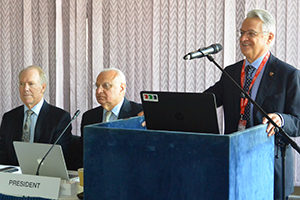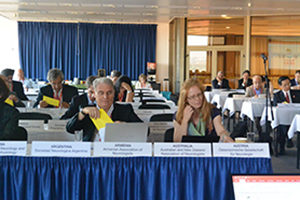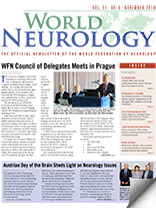
Emilio Perucca, MD, (right) president of the International League Against Epilepsy, welcomes the WFN Council of Delegates to Prague. Also pictured (from left): William Carroll, MD, WFN vice president, and Raad Shakir, MD, WFN president.
By Wolfgang Grisold, MD, and Steven L. Lewis, MD
The Council of Delegates of the World Federation of Neurology (WFN) met Sept. 12 during the 12th European Congress on Epileptology in Prague, Czech Republic. The meeting was opened by Emilio Perucca, MD, International League Against Epilepsy (ILAE) president, who welcomed the WFN delegates to Prague and emphasized the excellent connections between the WFN and the ILAE.
The introduction was followed by a welcome from WFN President Raad Shakir, MD. Secretary General Wolfgang Grisold, MD, identified 26 voting delegates, including proxies.
Gallo Diop, MD, PhD, recently ended his period as an elected trustee, and Dr. Shakir emphasized his achievements, in particular founding of the African Academy of Neurology (AFAN). For the open trustee position, two candidates, Sarosh M. Katrak, MD, and Steven L. Lewis, MD, applied and each gave a five-minute introduction. This was followed by voting.

The WFN Council of Delegates cast ballots, electing Steven L. Lewis, MD, as WFN trustee.
Dr. Shakir, Vice President William M. Carroll, MD, and Dr. Grisold each spoke on the achievements and work of the past year. Dr. Shakir informed attendees that John N. Walton, MD, and Noshir H. Wadia, MD, passed away in the the last year. The president also gave the final report from the the World Congress of Neurology (WCN) 2015 in Santiago, Chile, where 3,500 attendees made the meeting a success. Sixty percent of the profit made in Santiago was dedicated to the WFN and 40 percent to the Chilean Society of Neurology, Psychiatry, and Neurosurgery.
Collaborations with the World Health Organization (e.g., the Atlas), ICD 11, the Global Neurology Network, the WFN Zika working group (chaired by John England, MD), and the efforts of the WFN to improve neurology in all regions of the world were mentioned.
Dr. Carroll reported on the development of the next WCN in Kyoto, Japan, and the structure of the Congress. Three Nobel laureates will give lectures, and the number of sessions will be 210. The site of WCN 2019 is Dubai, United Arab Emirates. Applications from Europe for WCN 2021 were accepted until the end of September 2016.
The secretary general reported on five issues:
- The WFN office
- Zika
- The Day of the Brain
- WFN publications
- Outlook for the Congress
The Kenes Group will be the professional conference organizer for three more congresses. The secretary general also gave the reports from the Public Awareness Committee and the Applied Research Group Committee. The 2016 World Brain Day topic was “The Aging Brain.” The Day of the Brain will be continued in 2017, and the topic will be “Stroke.”
The WFN publications have a wide-ranging presence, from the website and social media, to World Neurology and the Journal of the Neurologic Sciences, to a new electronic journal, eNS.
The next neuromuscular congress — the International Congress on Neuromuscular Diseases (ICNMD 2018) — will be held in 2018 in Vienna.
Keith Newton, who served the WFN as executive director for 17 years, has retired, and his engagement and significant contributions to the WFN were acknowledged.
Richard Stark, MD, treasurer, presented the financial situation. Subsequent to the Congress in Chile, the financial situation has remained stable. Negative trends are the reduction of interest due to the economic situation in investments. The WFN will have to maintain the policy of lean management and careful budgeting, in particular, since in the years between congresses current costs exceed the income. The auditor’s report was approved, and the auditor was selected for the next financial period.
The Membership Committee received three applications, from Nepal, Togo, and Mauritania. Formally, Mauritania fulfilled all conditions and details and was accepted as a new WFN member. The other two countries were encouraged to resubmit their applications in Kyoto. For Guatemala, there are issues with regard to the presence of two societies accredited in 2001 by the WFN. The 2001 decision by the Council of Delegates to accept two Guatemalan associations has been reversed and approved by the South American delegates.
Education Committee Chair Dr. Lewis provided the report of the WFN educational activities, including the awarding of 30 Junior Travelling Fellowships in 2016. In addition, attendees were provided with an update on the the WFN department visit program for four-to-six-week visits, which now includes Austria, Canada, Germany, Norway, and Turkey. The status of the WFN Teaching Center program (for fellowship or full neurologic training) also was discussed. The program now includes two African centers, Rabat (a French-speaking site), Cairo (English-speaking), the newest center in Dakar (French-speaking), and the newest center in Mexico for Central and South America (Spanish speaking). The status and current usage of the Continuum program, an important joint educational initiative of the American Academy of Neurology and the WFN, also was discussed. Dr. Lewis and Walter Struhal, MD, editors of World Neurology, also reminded attendees of a call for articles on training in neurology around the world for publication in World Neurology.
Morris Freedman, MD, presented on distance learning, and he shared details about the Canadian-African interactive video conference as an example of future international medical video conferences that could possibly be supported by the Canadian government and include WFN involvement.
Dr. Struhal gave the report for the Publications and Communications Committee. He introduced the new and impressive WFN website and reported on the successful expansion on social media, including acknowledging the efforts of the social media group members.
Regional issues were presented by representatives from these regions:
- AFAN: WFN Trustee Riadh Gouider, MD, presented on African initiatives by the AFAN, which was founded in 2015. The first meeting together with the Pan-Arab Union will take place in March 2017.
- Asian and Oceanian Congress of Neurology (AOCN): The Asian Initiative was reported by Ryuji Kaji, MD, PhD, who presented on Asian initiatives, including the AOCN’s August 2016 meeting in Kuala Lumpur, which was organized by the Kenes Group. In 2016, at the Japanese Society of Neurology meeting in Kobe, there were several thousand attendees. This meeting also was attended by several WFN officers. Dr. Kaji also reported on positive developments with regard to planning of the WCN in Kyoto. Dr. Kaji also presented new features of Japanese research, including rehabilitation and treatment with stem cells in spinal cord injury.
- Pan-American Federation of Neurological Societies (PAFNS): Marco Medina, MD, presented the update from PAFNS, whose constitution and bylaws were signed during the 2015 Congress in Chile. The organization is supported by the ILAE, the World Sleep Society, and the Iberoamerican Cerebrovascular Diseases Society, and its first official meeting was scheduled to be held Oct. 30-Nov. 3, 2016, in Cancun, Mexico.
The announcement of the result of the trustee election was presented. There were 26 votes, and, according to tradition, the number of votes for each candidate were not announced. The result was that Dr. Lewis of the United States became the newly elected trustee of the WFN.
Finally, the attendees were reminded to save the dates of Sept. 16-21 for WCN 2017 in Kyoto.
